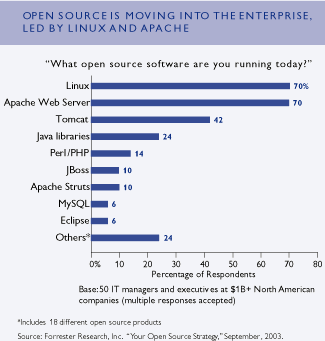I've talked about the two facets of the Open Source Community before, a quick summary of that one is:
First, you have the "Free Software" crowd. This segment of the community is based on the concept that "all software should be free". They actively work to further this goal via licenses and practices which encourage source code to be opened up and made available to others.
[snip]
Second, you have the "Open Source" crowd who believe that the OSS community provides real value to people and businesses for a fraction of the cost of the alternatives. Therefore, it's in their and the community's best interest to continue making contributions and improve the underlying infrastructure.
 From this CSC report from 2004 (horribly dated, but interesting nonetheless), it shows that businesses accepted Linux, et al, into their application stacks years ago. Most of them didn't get into Open Source for a political or ideological agenda, they got involved because it made sense.
From this CSC report from 2004 (horribly dated, but interesting nonetheless), it shows that businesses accepted Linux, et al, into their application stacks years ago. Most of them didn't get into Open Source for a political or ideological agenda, they got involved because it made sense.
It makes sense. Maintaining an [operating system, web server, programming language, IDE, database] is not their core competency but they either need customizations specific to their organization or the additional flexibility that comes along with an a open applicaiton stack. Either way, their acceptance of Open Source is based on Business Needs.
This is originally why I got involved with dotProject. I had a need for a collaborative Project Management system and the alternatives were too expensive or didn't have the correct features to be useful. In the four years since, dotProject has grown and adapted as the community and users have needed, but the vast majority of the improvements have come about as a result of companies sponsoring specific features and/or passing back their contributions. There's nothing special about this, it's how many Open Source projects operate. But I believe there are problems on the horizon.
Unfortunately, there are segments of the community – the "Free Software"-types as described above – that see things a bit differently. They believe in "freedom" above all… well, their definition of freedom. And that's where things get a bit nasty…
The traditional interpretation of the GPL is that "if the software can exist independent of the GPL components, it can be licensed separately". This is pretty easy to interpret and most developers know how to handle this sort of thing… pluggable components. The new interpretation of the GPL is that "if the software interacts with GPL components through an API, then the software must be licensed similarly."
I believe they've thrown down the gauntlet and this is one the biggest shots in their stated war against proprietary software.
Some of us believe that Open Source can win in the market place. Open Source can and does produce better solutions at a lower price and meet more while still being customizable to your business' needs. Further, some of us believe that user lock-in – whether accomplished through technology or license – works against the user.
We don't believe that proprietary software is evil. In fact, some of us use proprietary software on a daily basis. In most cases, we didn't have to buy it, we chose it because it fit our requirements. Yes, there are probably Open Source alternatives, but they don't meet our needs.
Well, I've about had it in this regard, so I've recently signed up with the highly esteemed Joomla'er Mitch Pirtle in his new effort called Open Source Hypocrisy. My goal in joining this effort is to bring situations like the above to light and demonstrate that Open Source acceptance and usage is also about Business Needs and not just Ideology. Wish me luck. 😉
